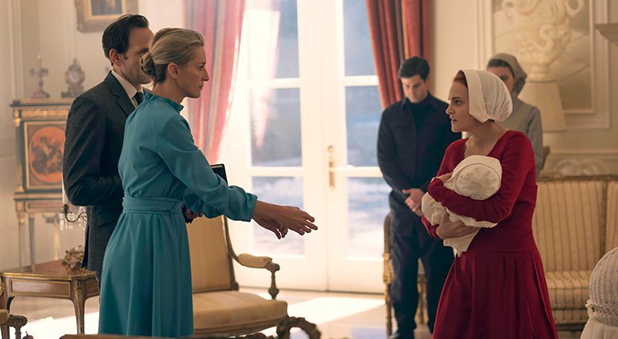When The Handmaid’s Tale TV series came out in April last year, it was seen as creating striking parallels to society today – with Donald Trump threatening female rights and attempting to build a wall in America, the underhandedness of the extreme right in America and the threats to women’s liberation.
The dystopian series showed an America in which fertile women were forced to act as handmaids for a rich upper class. The first series used flashbacks to highlight a challenging apathy among citizens as their freedoms were increasingly stripped away. Mid-2017, it felt like a dangerous warning against taking things for granted.
The justification for the society depicted in The Handmaid’s Tale rides on biblical underpinnings, taken out of context, for the benefit of the upper class. References to Rachel and Leah, to offspring as “fruit” and to different sins provide an uncomfortably distorted view of the Bible. Old Testament laws were maintained, such as stoning “gender traitors” and women are forced to wear clothes of specific fabrics and colours.
As a Christian viewer, it’s hard to watch a show like this – so horrifyingly wrong – and know how to deal with the biblical basis. If we don’t agree with the society shown in The Handmaid’s Tale, how can we respond to the values represented in the Bible?
Blessed be the meek
Possibly the most difficult phrase to understand is one taken straight from the lips of Jesus. Repeated again and again, the phrase “Blessed are the meek” was perhaps the most uncomfortable biblical appropropriation. It’s used as a way to control the handmaids. It’s used to justify abuse and silencing. It is used alongside electric cattle prods, designed to punish women if they don’t comply.
It is extremely important when addressing these lines, to read them in the context they were said. They weren’t said to subdue women; instead they were part of Jesus describing an attitude people should have when approaching God.
The full passage in Matthew 5:5-10 reads:
5 Blessed are the meek,
for they will inherit the earth.
6 Blessed are those who hunger and thirst for righteousness,
for they will be filled.
7 Blessed are the merciful,
for they will be shown mercy.
8 Blessed are the pure in heart,
for they will see God.
9 Blessed are the peacemakers,
for they will be called children of God.
10 Blessed are those who are persecuted because of righteousness,
for theirs is the kingdom of heaven.
All of the characteristics described have to do with an attitude to a relationship with God. Meek, which is better translated as “poor in spirit”, has to do with recognising that you are spiritually bankrupt before God. It’s also important to notice how strong the promise is to those who are meek: they will inherit the earth. This isn’t about subjugation, it is about liberation. Recognising that you need God, that you can’t do it by yourself, is the first step to becoming a member of the Kingdom of God. This acceptance into the Christian kingdom is a fulfilment of the salvation as pointed to in Isaiah 61.
God is a God of righteousness
If we keep reading, the next thing that Jesus says suggests there will be a time where wrongs will be put right.
Blessed are those who hunger and thirst for righteousness,
for they will be filled.
Part of what is so compelling and horrifying about The Handmaid’s Tale is the extent of the injustice, suffering and cruelty. And to that, we see the promise from a righteous and just God, that those who long for righteousness will be satisfied. This promise is ultimately fulfilled by Jesus’ death, which we recently celebrated at Easter.
As we watch The Handmaid’s Tale, it's important for us to remember that while this dystopian society is a warning for us not to take our current democracy for granted, but that we have a bigger promise of a day of justice from God.
Season 2 of The Handmaid’s Tale is on SBS from April 26.



























